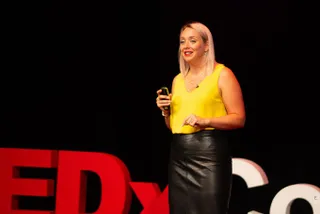
Equal Allies and #KillerStereotypes | A Q&A with Progressive Feminist Hannah Cotton
When studying feminism at school it was often hard to comprehend just how great the struggle was for the right to vote, to work, the right to own a house for example when we live in a society which takes those things for granted.
But, feminism is still an important conversation we need to have. The #MeToo, glass ceiling and equal pay debates have quite rightly brought to the forefront that we're a long way away from an equal society, indeed the equal society we hope our children will enjoy.
That said, is the debate now evolving to consider other factors we need to bring into play.
Hannah Cotton has taken a different approach to the feminism conversation by asking how women can help men! We sat down with her to find out what this means!
You've taken a different approach to the feminism conversation by asking how women can help men - so tell us how you came to this viewpoint?
Several years ago, my news feed contained prominent headlines relating to the oppression of women; the Global Outpouring of #MeToo and the gender pay gap. Much further down the newsfeed were the startling statistics related to male suicide and mental health, and how parental leave uptake was low despite changes to policy. I’m an analytical #MeToo survivor who refuses to wear the 'oppressed' label and started to question whether our focus on women and gender inequality rather than men and women was prohibiting our progress.
If we want gender equality, why not simultaneously look to understand and change the issues that disproportionately impact BOTH genders? Can we apply the lessons we've learnt in identifying and tackling barriers to inequality for women to men? Could this help us understand and prevent men's over-representation in violent crime, substance abuse, bullying and harassment, gambling, homelessness, and suicide? The more I understood about the barriers to inequality women face, the more I appreciated the tools I've been given to challenge them. If we were to provide men with the same tools, unleashing authenticity and potential, could we improve outcomes for us all?
What was the thinking behind #KillerStereotypes?
Simply, Killerstereotypes are harmful stereotypes, relating to gender, race, sexuality, age or any other form of difference. They drain public spending, limit productivity and damage lives. Everyday Sexism did a great job at highlighting the insidious ways women are treated differently dependent upon their gender, but I fear that by excluding men, it's limited the opportunity to open a discourse about how stereotypes impact individuals, regardless of their difference. By tackling them we can unleash productivity potential and improve wellbeing.
How do you think the traditional male stereotype fits into our modern day society?
My talk often promotes conversation regarding the qualities of the Man Box, originally defined by Tony Porter. Men should be successful, in the bedroom, board room and ball field. To do so he should be powerful, dominant, controlling, strong, emotionless and fearless. Many people have pointed out that these qualities are essential for evolution and survival. However, issues arise when these qualities clash with feelings of shame, disrespect, ridicule and humiliation. These are the qualities expert James Gilligan attributes to all violent acts. Whether the violence is directed against yourself or others, our ability to manage negative emotions in modern society is essential to reduce violence in our homes, harassment in the workplace and assaults on the street.
What's the feedback been so far on the corporate circuit? And what what challenges do businesses have to create an equal culture?
Feedback relates to how simply my perspective can be applied to improve wellbeing and productivity of the entire workforce - not just those with protected characteristics. By engaging with all employees and acknowledging that society may prevent ALL individuals from being their most authentic self, I break down the labels of victim and oppressor and instead advocate for acceptance of authenticity; enabling teams to achieve success by capitalising on individual strengths.
If you had one message you wanted to leave an audience with, what would it be?
That men and women can be Equal Allies. Male Allies add weight and volume to age old feminist arguments. But I believe women have effectively learnt how to identify and challenge KillerSterotypes, passing on that power to each generation. But men haven’t adapted at the same pace. They’ve been stuck in the Man Box. So, as long as women raise sons, have husbands, fathers, brothers and male colleagues, women can support men by teaching them how to be free to be whatever they want to be too; including a stay at home dad, nurse and primary school teacher! We can teach men to abandon the stereotypes that hold them back and prevent them from achieving their potential, improving their wellbeing and managing emotions healthily.
And finally, which audiences in particular would you like to address in the future?
I really appreciate the breadth of opinion in this conversation and love inspiring like minded people, and maybe I’m a glutton for punishment, but I also love to speak to those who disagree with me most. To the women who think men don’t deserve help and men who think they don’t need help. Only by understanding our differences together, do I think we can accelerate the equality conversation.
For further information or to book one of our speakers, call us on +44 (0)20 7607 7070 or email info@speakerscorner.co.uk .
Newsletter Sign Up
If you liked this article then why not sign up to our newsletters? We promise to send interesting and useful interviews, tips and blogs, plus free event invites too.
Have an enquiry?
Send us a message online and we'll respond within the hour during business hours. Alternatively, please call us our friendly team of experts on +44 (0) 20 7607 7070.
